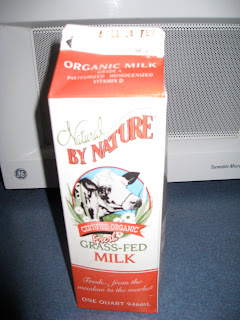I was intrigued, because I've seen studies from Denmark and Great Britain (among other places) that show that organic pasture-fed milk has more fatty acids and is higher in antioxidants, beta carotene, Vitamin E, and other nutrients than conventional milk. Now, if you're comparing factory-farmed dairy cows that are fed organic grain (and barely pasture-fed) vs. factory-farmed dairy cows that are given conventional grain, then maybe there is little nutritional difference. That's why pasture-feeding is so key to the definition of organic dairy and why organic/family farming organizations like the Cornucopia Institute put up such a fuss when factory-farms claim to be organic yet barely show their cows what a pasture looks like.
Nonetheless, even if the nutritional values of the two were the same, non-organic milk contains antibiotic residues, which scientists believe contribute to antibiotic resistance, a serious health problem in this country. Non-organic cows are also fed synthetic growth hormones, called bovine somatotropin. This bST, as it is sometimes known, and another hormone it produces (an insulin-like growth factor called IGF-1) have been shown to be present in milk. I don't care what the FDA says about "safe levels": Does anyone really want to feed their kids synthetic bovine growth hormones?
I got curious about the website Louise had linked me to, Stop Labeling Lies, so I looked at it in a bit more depth. [Note that I am not going to provide links to any of the sites mentioned below. You can reach them through About Us page on Stop Labeling Lies if you really want to visit them.]
One of its "participating organizations" is the important-sounding Center for Global Food Issues, whose motto is straight out of Monsanto's mission statement: "Growing More Per Acre Leaves More For Nature." They are associated with the conservative think tank, The Hudson Institute, and have stories on their web site like "Greenpeace Opts for Millions of Blind Kids." (Those villains! That's the last time I'll give them money in the street!)
Another is the objective-sounding American Council on Science and Health, which has an article on its web site that says: "The Harvard School of Public Health (HSPH) has now firmly established itself not as an institution for higher learning, devoted to educating students about the science of preventing premature disease and death, but instead as a hotbed of pseudoscience and political agitation..." (Yes, we know all about those Harvard public health Trotskyites.)
Something called the Food Security Network is also a sponsoring org, the link to which leads one to a very bizarre web site whose focus is really hard to suss out. I did appreciate one of their food security stories: "Hormel premium sliced deli meats are now packaged in a clear flexible pouch with an integrated Hefty Slide-Rite closure system, supplied by Pactiv Corp., that helps the meat retain its fresh flavor even after the package has been repeatedly opened and closed." (Well, I feel much safer now.)
Another sponsor: "The Competitive Enterprise Institute is a public interest group dedicated to free enterprise and limited government." It was called by the Wall Street Journal "the best environmental think tank in the country." (And the climate-change-denying WSJ should know!)
Anyway, I'm going out on a limb and guess that Stop Labeling Lies is a front for mega-food-agribusiness companies and their political allies. Labeling lies, indeed.
P.S. If you want to know if the organic milk you drink is truly pasture-fed and meets other high standards for organic dairy, the Cornucopia Institute has a scorecard for all dairy companies that claim to be organic. Interesting reading.
Our brand, Natural By Nature, got 4 out of 5 cows on the Cornucopia Institute's scorecard.

This reminds me of the Supreme Court's new ruling allowing corporations to spend unlimited amounts on campaign ads, yet not requiring them to name their companies outright within the ads. Now, we'll be bombarded with ads that claim to be sponsored by "Citizens for A Brighter Future," which will turn out to be GE, or the like.
ReplyDelete